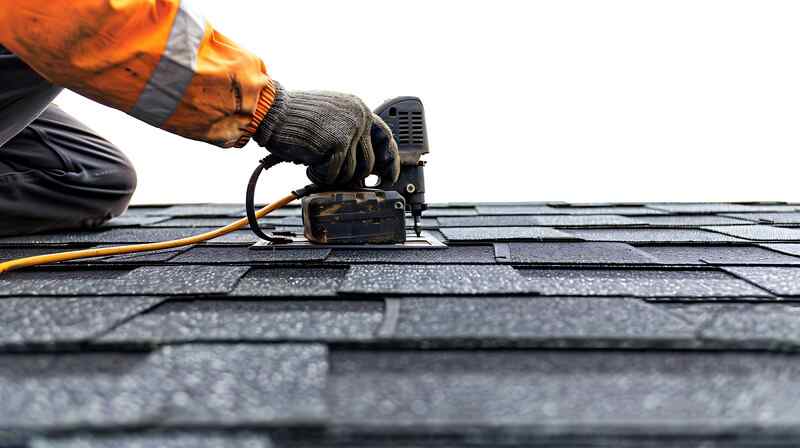Roof Replacement Guide for Contractors: Steps and Costs
The global roofing market is projected to hit $156 billion by 2030 with a steady 4.3% annual increase. Needless to say, the future looks bright for roofing professionals.
But to succeed in this competitive field, you need to know how to make accurate roofing estimates. This crucial skill helps you win bids, secure clients, and ensure your business remains profitable.
Here’s a breakdown of the key factors that influence roof replacement costs. From understanding the impact of roof size to accounting for labor costs and overhead, you’ll gain the knowledge you need to confidently bid on projects.
FROM ONE OF OUR PARTNERS — Roof Estimating 101: How to Estimate a Roofing Job
How Much Does a Roof Replacement Cost?
Replacing a roof is a major project that typically comes with a significant price tag. According to Forbes, the average roof replacement costs $11,500. However, the total price could be anywhere from $6,700 to $80,000 or more, depending on key factors.
The main elements that influence the new roof costs are:
- Size. Roofers typically charge per roofing square (a 10×10-foot area or 100 square feet). The larger the roof, the more clients pay for both materials and labor.
- Materials. Asphalt shingles, slate tiles, and wooden shakes are some of the most common roofing options. Asphalt is the most affordable option, while materials like metal, tile, and slate are more expensive. The type of underlayment used also affects this cost.
- Labor. Professional installation accounts for a large portion of the total cost of a new roof. Rates vary depending on the contractor and location, but most contractors charge per foot.
- Pitch. The steeper the roof, the more dangerous and difficult it is to work on. A roof with a roof pitch over 6:12 is considered steep. This means you can charge more due to the extra safety equipment and time required. Always calculate the pitch before you start work.
- Underlying Damage. Significant damage needs to be repaired, which affects your roofing estimate. Examples include serious water damage, sagging, and any other structural issues that may pose a safety risk.
A good way to get a ballpark figure to start with is to use a roofing cost calculator, which gives you a rough estimate of the cost of replacing a roof based on the home’s square footage. Then, you can consider other factors like pitch and materials.
RELATED ARTICLE — How To Do an Invoice for Roofing (With Free Invoice Template)
How Much Does Roof Replacement Cost by Material Type?

The type of roofing material your client wants has a big impact on the total replacement cost. Here’s a look at the price ranges for some of the most common options and what contractors typically charge for materials to replace an average 1,700square-foot roof, according to Modernize’s roofing cost calculator:
- Asphalt Shingles. Asphalt shingles are affordable and durable, making them the most popular choice. They cost between $1.75 and $3.20 per square foot, or about $2,975 to $5,440 for an average roof replacement. High-quality architectural shingles, which are still asphalt but have a more effective shape, can be significantly pricier.
- Metal Shingles. Metal roofs are pricier than asphalt but offer excellent longevity and energy efficiency. Metal shingles range from $3.10 to $29.65 per square foot. An average 1,700-square-foot roof should cost between $5,270 and $50,405 to replace.
- Cedar Wood Shakes. Wood shakes provide natural beauty and good insulation at a higher cost than asphalt. Expect to pay $6 to $9.50 per square foot for wood shakes or $10,200 to $16,150 for an average-sized roof.
- Clay Tiles. Clay offers an elegant look popular in Mediterranean and Spanish-style homes. These tiles cost $8.36 to $15.25 per square foot so a typical roof replacement would run about $14,212 to $25,925.
- Concrete Tile. Similar to clay in appearance, concrete tiles are very durable but also heavy. Concrete runs $3.83 to $6.98 per square foot or $6,511 to $11,866 to roof an average home.
- Slate Tiles. Slate is a very attractive, long-lasting option, but it’s also expensive. At $6.65 to $12.13 per square foot, an average slate roof replacement costs between $11,305 and $20,621.
It’s important to remember that these are average ranges. If you have a good relationship with a reputable supplier, you can offer clients better prices.
RELATED ARTICLE — How To Price a Roofing Job
How Much Does Roof Replacement Cost by Roof Size?
The size of a roof is one of the biggest factors in the total cost of replacing it. Larger roofs require more materials and labor, which means a higher overall price tag.
Here’s a look at some common roof sizes and the average cost to replace a roof of each size. Keep in mind that these ranges are based on the roughly $3 to $15 per square foot that contractors typically charge for common materials. For very complex roofs or premium materials, you may end up charging significantly more.
| Square Feet | Cost (in USD) |
| 1,000 | 3,000–15,000 |
| 1,100 | 3,300–16,500 |
| 1,200 | 3,600–18,000 |
| 1,300 | 3,900–19,500 |
| 1,400 | 4,200–21,000 |
| 1,500 | 4,500–22,500 |
| 1,600 | 4,800–24,000 |
| 1,700 | 5,100–25,500 |
| 1,800 | 5,400–27,000 |
| 1,900 | 5,700–28,500 |
| 2,000 | 6,000–30,000 |
| 2,100 | 6,300–31,500 |
| 2,200 | 6,600–33,000 |
| 2,300 | 6,900–34,500 |
| 2,400 | 7,200–36,000 |
| 2,500 | 7,500–37,500 |
| 2,600 | 7,800–39,000 |
| 2,700 | 8,100–40,500 |
| 2,800 | 8,400–42,000 |
| 2,900 | 8,700–43,500 |
| 3,000 | 9,000–45,000 |
RELATED ARTICLE — What Is a Service Business?
Roof Replacement Versus Roof Repair

When consulting with a client, there’s one more factor to consider: replacement versus repair. The decision comes down to the condition of the roof and your client’s budget.
If the damage is minor and localized, a repair may be enough. But if the damage is widespread, a full replacement is likely a better choice. Patching a failing roof may only lead to more problems and expenses for the client down the road.
The age of the roof is the next important consideration. The average asphalt shingle roof lasts about 20–30 years. If the age is close to or past this range, it may be time for a new roof unless it was built using a more durable material.
RELATED ARTICLE — How To Become an Independent Contractor: A Complete Guide
7 Pro Tips for Excelling as a Roofing Contractor
If you’re looking to start or grow a roofing business, here are some key tips to set yourself apart as a top-notch professional:
- Use a Roofing Estimate Template. When you send clients estimates, having consistent documentation helps you look professional. It also standardizes your estimates so you always know where to find what information.
- Stay Sharp. Stay up to date on the latest roofing techniques and industry trends by attending workshops, conferences, or manufacturer training sessions. This sets you apart from the crowd and makes sure you’re always up to speed.
- Be Safe. Roofing is inherently dangerous work. Prioritize safety training for your crew and adherence to Occupational Safety and Health Administration (OSHA) guidelines. It’s worth it to protect your team and maintain a solid reputation.
- Treat Their Home Like Your Own. Show respect for the customer’s property. Keep the work area clean, protect landscaping and exterior elements, and clean up thoroughly when the job is done. Otherwise, you risk an unhappy client and a poor reputation.
- Build a Portfolio. Document your best work through photos and customer testimonials. A strong portfolio demonstrates your expertise and attracts new clients.
- Get the Right Licensing and Insurance. Make sure you meet all the legal requirements to operate as a roofing contractor in your area. This typically includes obtaining a business license and carrying liability and workers’ compensation insurance. It depends on your area, so check the licensing board wherever you are.
- Invest in Quality Tools and Materials. Using high-quality products and equipment makes for a job well done. It also reduces the risk of callbacks or customer complaints.
RELATED ARTICLE — How To Do an Invoice for Roofing (with Free Invoice Template)
Stay Organized and Manage Customers on the Go
Keeping your estimates, invoices, and other key information is critical for running a successful roofing business. Joist is here to help.
With Joist’s all-in-one contractor app, you can store, access, and export customer information from anywhere at any time. Tracking customers and jobs just got that much easier.